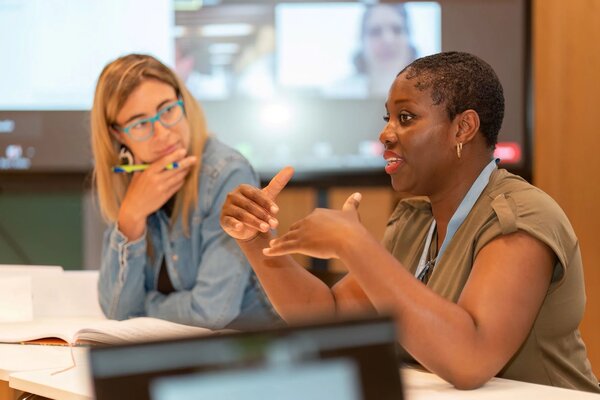Das Potenzial der KI für die sexuelle und reproduktive Gesundheit und die damit verbundenen Rechte
KI hat das Potenzial, unseren Umgang mit sexueller und reproduktiver Gesundheit zu verändern, indem Gesundheitsdienstleistungen zugänglicher, personalisierter und effektiver werden und gleichzeitig das Recht jedes Einzelnen fördert, fundierte und autonome Entscheidungen über seine Sexualität und reproduktive Gesundheit zu treffen. Sie kann auch die Aufklärung fördern und Diskriminierung und Stigmatisierung verringern.
Die nächsten fünf Jahre werden darüber entscheiden, wie die Auswirkungen der Technologie sich auf die Entwicklungen im Bereich der sexuellen und reproduktiven Gesundheit sowie auf die Gesundheitssysteme insgesamt auswirken. Die Möglichkeiten sind vielfältig: KI bietet ein großes Potenzial für prädiktive Analysen, wie z.B. bei der Prävention der Müttersterblichkeit. Soziale Medien können auch genutzt werden, um die Gesundheit in Echtzeit zu schützen. Zudem kann die internationale Zusammenarbeit angesichts dringender gesundheitlicher Herausforderungen gestärkt werden. Gleichzeitig sind wir gefordert, unmittelbare Bedrohungen wie Cybermobbing, digitale Überwachung und Desinformationen, die den Fortschritt behindern könnten, entschieden bekämpfen.
Die MMS-Konferenz 2025
Die MMS-Konferenz hat zum Ziel, zu untersuchen, wie digitale Innovationen zur Förderung der Gesundheit eingesetzt und gleichzeitig die damit verbundenen Herausforderungen bewältigt werden können. Ein Beispiel ist die Bekämpfung von Desinformation in sozialen Netzwerken oder die Gewährleistung, dass KI-Algorithmen inklusiv und fair sind. Die Expertinnen und Experten unserer Konferenz werden diese Transformation und ihre zahlreichen Herausforderungen diskutieren und sich auf die Entwicklung praktischer Strategien, die Innovation und Verantwortung vereinen, konzentrieren.
Die Konferenz wird ein zentraler Ort sein, um entscheidende Fragen wie Potenziale, Chancen, Herausforderungen und Bedrohungen im Zusammenhang mit künstlicher Intelligenz zu diskutieren; um zu hinterfragen, wie soziale Medien unsere Mission und Vision von Gesundheit für alle unterstützen und wie Vorurteile und Diskriminierung gegenüber Minderheiten und schutzbedürftigen Bevölkerungsgruppen (Menschen mit Beeinträchtigungen, junge Frauen, LGBTQ+, etc.) bekämpft werden können.
Gemeinsam mit unseren Referent:innen freuen wir uns sehr darauf, Sie am 30. April 2025 in Bern zu einem bereichernden Austausch und einer vertieften Debatte begrüßen zu dürfen. JETZT ANMELDEN!
Andréa Rajman
Netzwerk Medicus Mundi Schweiz
E-Mail









































